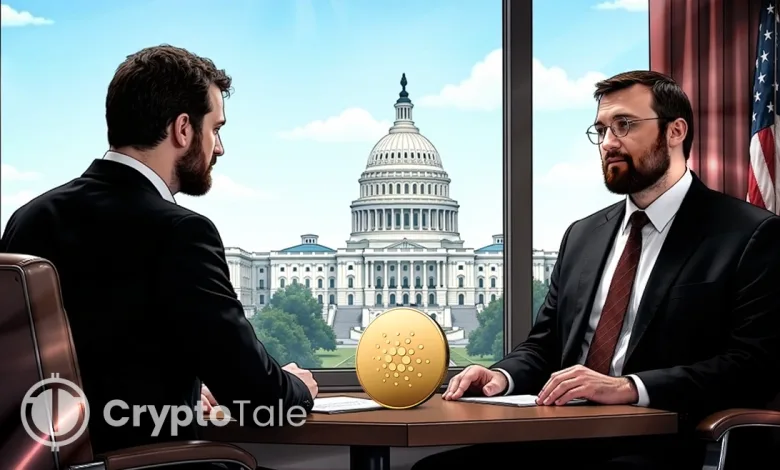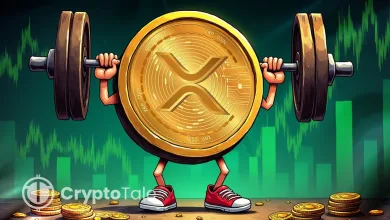Cardano Founder Leads D.C. Talks on Stablecoin Rules and Crypto Policy

- Charles Hoskinson leads top-level crypto policy talks with U.S. lawmakers in Washington, D.C.
- The Genius Act promotes stablecoin oversight without enabling a central bank digital currency.
- Hoskinson says stablecoins could power a market worth trillions of dollars by 2030.
Charles Hoskinson, the founder of Cardano and co-creator of Ethereum, has emerged as a key voice in Washington’s growing conversation around crypto regulation. This week, he confirmed participating in high-level meetings with senators, policy officials, and industry experts. “We’re getting it done,” Hoskinson said, signaling a shift in the federal government’s posture toward the crypto industry.
Hoskinson described a noticeable change in attitude among lawmakers. Unlike in past visits, where conversations were limited or dismissed, this time, the doors are open. Legislators are engaging in technical, forward-looking discussions, focusing on how blockchain can support long-term economic goals.
Genius Act Aims to Regulate, Not Control
The central focus of these discussions is the Genius Act, a bill designed to regulate stablecoins issued by private entities. The bill outlines audit requirements, reserve backing, and transparency measures. Contrary to public speculation, it does not authorize a central bank digital currency (CBDC).
Hoskinson directly addressed concerns over a government-issued digital dollar. “There’s no authorization for a CBDC in the Genius Act,” he stated. “Private industry issues them. The government doesn’t.” He made it clear that the bill promotes responsible innovation, not federal control.
He believes the Genius Act could unlock massive growth in the crypto economy. “If Genius passes, the stablecoin market will be over a trillion dollars by 2030,” Hoskinson said. Over $243 billion in stablecoins are already in circulation, and the sector is set to grow fast playing a key role in dollarizing developing economies.
Crypto developers and companies are already moving to such tax havens as Switzerland, Singapore, and United Arab Emirates. The United States may not be able to retain the advancement over its digital financial business in the absence of legal clarity.
Hoskinson praised Congress for taking the lead where previous administrations had not. He said lawmakers are now asking the right questions about crypto’s structure, use cases, and legal needs. These conversations, he said, are more productive than anything seen in recent years.
Related: Charles Hoskinson Denies $600M ADA Misuse, Audit in Progress
Whether it is an investment contract or decentralization remains under debate and the definitions of these terms and phrases in the legislation are also discussed. Other structures being proposed by legislators include self-regulatory bodies (SRO) and interagency task forces to facilitate compliance and regulation.
Hoskinson Warns Against Politicizing Blockchain
Partisan politics, however, continue to create obstacles. Hoskinson noted that some Democratic lawmakers are hesitant to support crypto legislation because of its perceived connection to Republican figures, including Donald Trump. He warned that this approach is short-sighted.
Most crypto entrepreneurs, he pointed out, are young, diverse, and often lean progressive. Framing blockchain as a partisan issue could alienate a generation of innovators and potential donors. “You’re pushing away an entire tech sector,” he said.
Hoskinson stressed that crypto should be treated as infrastructure, not ideology. He urged leaders across party lines to focus on economic opportunity, innovation, and global competitiveness. “This is about making America the best place to build,” he said.
He also emphasized the need for alignment with international standards. U.S. regulatory efforts, he argued, should complement global frameworks like Europe’s MiCA to ensure cross-border compatibility and market access.
Hoskinson suggested that National Institute of Standards and Technology (NIST) should take part in the establishment of the technical concepts. Definitions of blockchain, decentralization, and digital assets would lower the level of legal uncertainty and increase the enforcement of consistency.
He criticized previous enforcement-led strategies as ineffective and harmful to innovation. Instead, he advocates for proactive legislation that offers certainty and encourages responsible development within the U.S.
“The right people are in the room,” Hoskinson said, reflecting optimism about the direction of talks. “This is the moment for real progress.”
The crypto industry closely monitors the gains being made on the Genius Act. The consequences may determine the future of digital assets in the USA over years.




